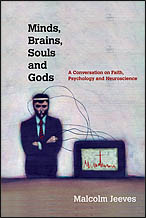
There is a pressing need for healthy dialogue regarding the psychology, and biology, of faith. Do humans have free will? What are the respective roles of the mind, the soul, and the brain? Are reports of supernatural experiences evidence for or against the existence of Heaven? Are we pre-conditioned to seek out a divine being? These are not questions from which Christians should not shy away. In fact, I’m convinced that by leaning into the discussion, our faith will be deepened and enriched.
Dr. Malcolm Jeeves’s latest book, Minds, Brains, Souls and Gods: A Conversation on Faith, Psychology and Neuroscience [1], offers a first step into encounters with questions of psychology and faith. Jeeves’s long and esteemed career in psychology gives him a wealth of knowledge from which to draw. Presented in the form of email dialogue between a freshman psychology student and an emeritus scholar, Jeeves’s book presents both current and historical scholarly perspectives on our existence as physical, intellectual, and spiritual beings. Accessing these deeply seasoned perspectives in such an approachable manner is a rare opportunity for the lay public.
I confess it took me a while to settle into this text. Jeeves is careful to orient uninitiated readers to the academic frameworks discussed, but many of the topics of most interest personally were found in the later chapters. The book offers many rich topics for debate, but tries to cover a significant amount of ground in its pages. In this sense, it presents an excellent overview of many of relevant questions, but does not have the luxury of investigating any specific topic with significant depth. Nevertheless, Jeeves offers many additional resources with which intrigued readers might delve into individual topics of particular interest. Without becoming too bogged down, Jeeves touches of the avenues of thought that will lead to deeper dialogue on any given subject.
Jeeves speaks strongly against the false dichotomy between scripture and science, a perceptive that I greatly appreciated. Too often scholars of faith find themselves caught between two misunderstood worlds, trying to navigate a divide that in reality is entirely unwarranted. Jeeves encourages us to “be intellectually honest,” without fear of our own cognitive capacity.
Jeeves pushes us to expand from ‘safe’ conversations that ultimately create strawman faith. We don’t have to turn off our minds in order to walk through a church door. If we only engage in the easy-win debates, we will always fear the inability of God to withstand true examination.
There is a holy space in the incomprehension of God. To get there, we will need to relinquish our need to shield God from our minds. After all, why would we worship a God that we fully understand? This would be a very small God indeed. Rather than a stagnant arrival at a boxed-in faith, we can instead participate in an active journey toward the mysteries of the Cross.
The matters presented in Jeeves’s book are worth continued discussion. In doing so, however, we must be careful not to perpetuate the appearance of a false divide between science and faith. Rich debate should be welcomed, but reductivist separation in unwarranted. Both institutions have had their share of major abuses of trust in the name of advancing their own ideas, which further widens the chiasm of communication between them. Books like this one are necessary to begin to mend those wounds, and restoring interdisciplinary trust.
Many of the answers provided in each chapter will not satisfy those well practiced in these discussions, nor will the text necessarily argue its way into the hearts of staunchly unbelieving. But Jeeves is able to counter many of the superficial first jabs at intellectual faith and offers an excellent entry point for students beginning to wrestle with these questions. Offering unique access to a leading thinker at a lay level, Minds, Brains, Souls and Gods is an excellent way to encourage young thinkers tackle these issues.
- Editor’s note: “Thank-you!” to Katelin for responding to the book review request I gave in my fall posts on Minds, Brains, Souls and Gods: A Conversation on Faith, Psychology and Neuroscience. It’s great to have Katelin on the team of contributors. To God be the glory! ~ Thomas B. Grosh IV ↩
Katelin Hansen (@BTSFblog) is pursuing a doctorate degree in neuroscience at Ohio State University (OSU). At OSU she is active in InterVarsity’s Christian Graduate Student Alliance and the Emerging Scholars Network. In addition, Katelin edits By Their Strange Fruit (BTSF), an online ministry facilitating justice and understanding across racial divides for the sake of the Gospel. BTSF explores how Christianity’s often-bungled relationship with race and racism affects modern ministry and justice. Recognizing that racial brokenness hinders our witness to the world, BTSF strives to increase the visibly of healthy and holy racial discussion by approaching justice and reconciliation from a Christ-minded perspective. Katelin also serves as the Minister of Music at UM Church For All People, a multi-class, multi-racial church in an underprivileged neighborhood of Columbus, OH. To learn more about her academic journey read A Full Education (The Well). You can find her on Twitter at @BTSFblog
